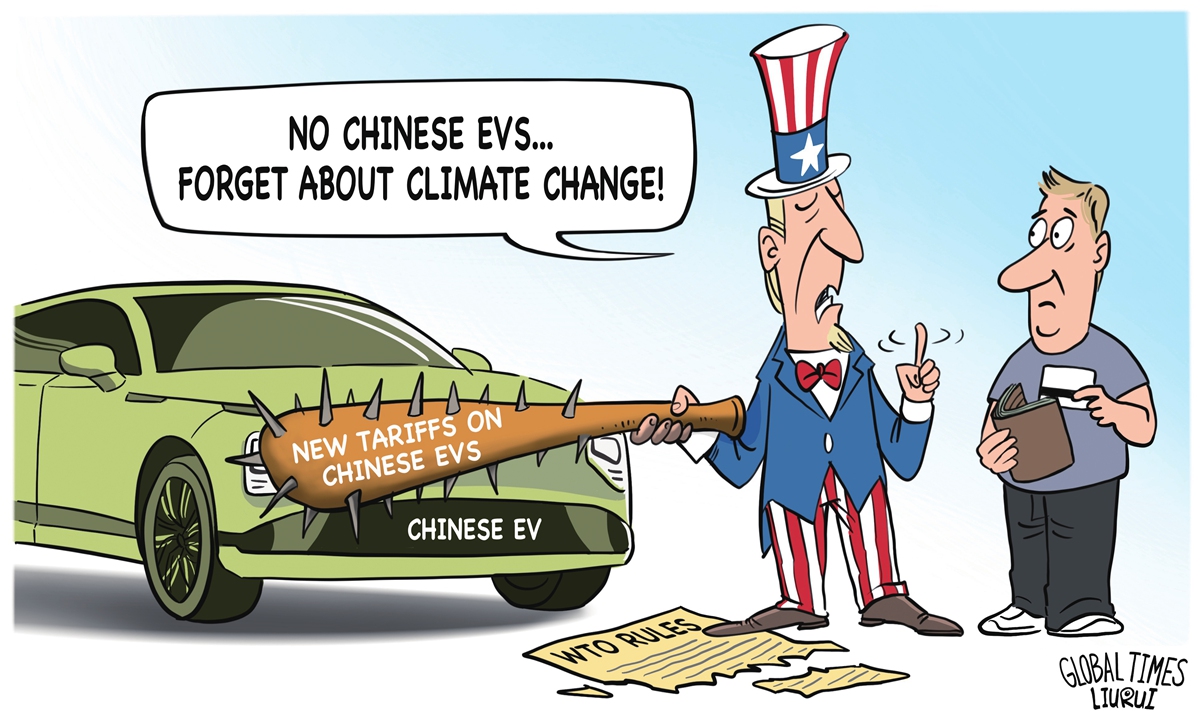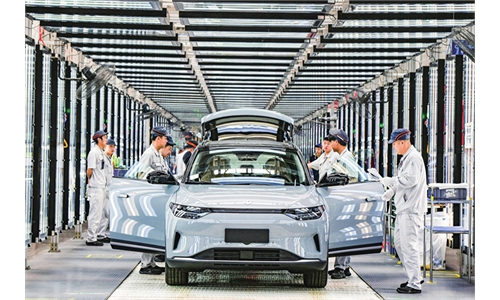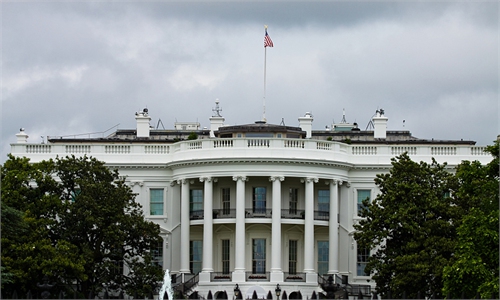
Abusing tariffs. Illustration: Liu Rui/GT
Chinese Foreign Minister Wang Yi on Wednesday sharply criticized the US' latest move to significantly hike tariffs on an array of Chinese goods, including electric vehicles (EVs). He said that the US' relentless crackdown measures amounted to typical bullying, exposed Washington's lack of confidence rather than strength, and will not stop China's development.
On the same day, the Chinese Foreign Ministry also urged the US to follow WTO rules and immediately cancel new tariffs on Chinese products and it once again vowed to take all necessary measures to defend Chinese interests. Many Chinese businesses in areas that were targeted by the US' new tariff hikes said that the levies will only have limited impact on their operations due to small exposure to the US market.
Washington's announcement marked another serious escalation in its crackdown campaign against China, and has sparked widespread concerns around the world, including among US allies in Europe, as many are worried about the global repercussions of worsening trade tension between the world's two largest economies. Meanwhile, some US businesses also criticized Washington's move for potentially raising costs for US consumers and expressed concerns about possible countermeasures that China would take.
Following a lengthy review, the Biden administration on Tuesday announced tariff hikes on an array of Chinese products, including EVs, batteries, computer chips and medical equipment. It also kept additional tariffs on Chinese products that were imposed by former US President Donald Trump. The WTO has ruled that the US' so-called Section 301 tariffs violate global trade rules.
Commenting on the US' decision during a joint press conference with Pakistan's Deputy Prime Minister and Foreign Minister Mohammad Ishaq Dar in Beijing on Wednesday, Wang said that the US' almost frantic suppression against China's normal economic, trade and technological activities is the most typical form of bullying in the world today, and it shows that some people in the US have gone to the point of losing their minds in order to maintain their unipolar hegemony.
"The US' unscrupulous efforts to suppress China do not prove US' strength, but expose that it has lost confidence and become confused. It does not solve the US' problems, but will cause further damages to the normal operation of the global supply chain. It cannot prevent China's development and revitalization, but will instead inspire the 1.4 billion Chinese people to work harder," Wang said.
"Unilateral actions and protectionism go against the development trend of the times and will be crushed by the wheels of history," Wang noted.
Wang further said that at this critical juncture of global economic recovery, the international community should warn the US not to create new problems for the world.
Also on Wednesday, Chinese Foreign Ministry spokesperson Wang Wenbin said it is yet another mistake for the US to continue politicizing trade issues and further increasing tariffs on Chinese products. This will only significantly drive up the cost of imported goods, inflict more loss on American companies and consumers, and make the US consumers pay even more.
"We urge the US to earnestly observe WTO rules and immediately cancel the additional tariffs on China. China will take all measures necessary to defend our rights and interests," Wang Wenbin said.
Global concerns
The US' move has also sparked serious concerns in Europe. Asked whether they support levying tariffs on Chinese EVs, Swedish Prime Minister Ulf Kristersson and German Chancellor Olaf Scholz offered lukewarm responses, according to Agence France-Presse.
"As far as tariffs are concerned, we are in agreement that it is a bad idea to dismantle global trade," Kristersson told reporters in Stockholm. Scholz, who was visiting Sweden, stressed the importance of trade between China and the West.
"There are European and North American manufacturers that succeed on the Chinese market and which sell their vehicles in China, we need to remember that," the German chancellor said, per AFP.
The EU has also launched a so-called anti-subsidy investigation into Chinese EVs, after which the bloc might decide whether to impose tariffs or take other measures against China. Chinese officials and experts have slammed the EU's probe. Some European leaders and businesses, especially EU carmakers that rely heavily on the China market, have also expressed opposition.
Zhou Mi, a senior research fellow at the Chinese Academy of International Trade and Economic Cooperation, said that while the US' move set a very bad example for the world, which is already seeing a rising tide of protectionism, other countries might be more cautious given the huge interests at stake.
"At a time when the world economy is still in recovery and faces great pressure, sending such a bad signal is detrimental to economic stability," Zhou told the Global Times on Wednesday, noting that the US' move could have negative impact on global trade and industrial investment.
For Chinese businesses, the US tariffs, coming on the heels of Washington's multi-year crackdown campaign, will have limited impact. Many Chinese businesses, including leaders in the solar cell and battery industries, said on Wednesday that they don't anticipate any major impact.
In contrast, the US tariffs could further add to costs for US businesses and consumers and undermine its decarbonization goals, according to industry participants.
"History will show punitive tariffs ultimately do not work ... US consumers will pay more and onerous import tariffs contribute to inflation," said Manuel C. Menendez, founder and CEO of MCM Group Holdings, who was one of the earliest US businessmen to come to China.
Moreover, "this announcement today sets the stage for a tit-for-tat response from China and a more aggressive trade war," Menendez told the Global Times on Wednesday.
Various studies have shown that the US-initiated trade war, chiefly against China, has inflicted pain on the global economy, and further escalation could compound such a damage. A report from US ratings agency Fitch released in May showed that in scenarios where the US lifts tariffs aggressively, the US would see short-term hits to the level of GDP between 0.4 percent and 0.8 percent, and if the US' trading partners retaliate with tariff rises of their own, the impact would be larger - up to 1.1 percent - and more persistent.
Chen Fengying, an economist and former director of the Institute of World Economic Studies at the China Institutes of Contemporary International Relations, said the latest US move dealt another huge blow to the world economy.
"It is a relatively big blow to the world economy, global trade, and international economic governance," Chen told the Global Times on Wednesday, noting that the US' move further exacerbates tensions, hurt global confidence and could lead to increasing conflicts and divisions.



